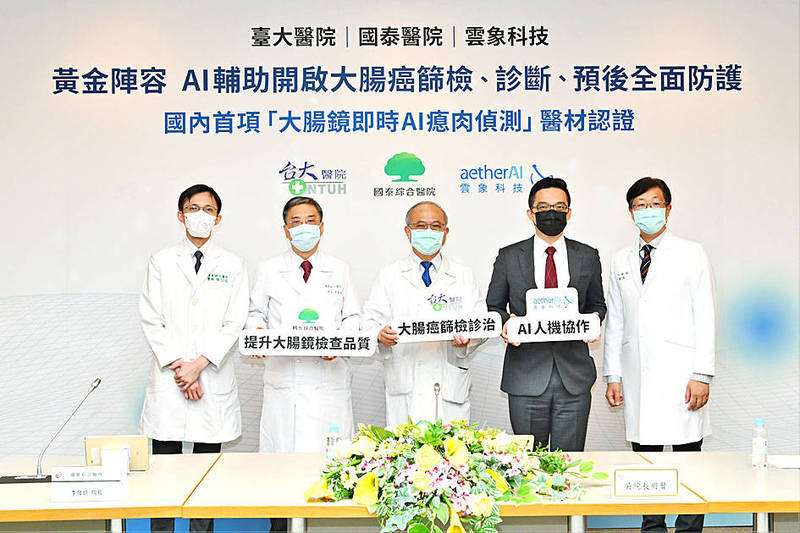《TAIPEI TIMES》 Hospitals, AI firm develop cancer screening system

From left, Cathay General Hospital gastroenterology division attending physician Chen Xin-you, hospital superintendent Lee Fa-kung, National Taiwan University Hospital superintendent Wu Ming-shiang, aetherAI CEO Joe Yeh and National Taiwan University Hospital Health Management Center and Department of Integrated Diagnostics and Therapeutics director Chiu Han-mo pose for a photograph at National Taiwan University Hospital in Taipei yesterday. Photo courtesy of National Taiwan University Hospital
EARLY WARNINGS: Colon cancer has been the most common cancer in Taiwan for the past 14 years, and improved detection would help save lives, a doctor said
By Lee I-chia / Staff reporter
National Taiwan University Hospital (NTUH), Cathay General Hospital and aetherAI yesterday announced an artificial intelligence (AI) system to help detect polyps and tumors during colonoscopies, with 96 percent accuracy.
The aetherAI Endo system reviews colonoscopy images, performing AI inference at 30 frames per second, and sounds an alert when a suspected polyp or tumor is detected, Cathay General Hospital gastroenterology division director Hung Chih-sheng (洪志聖) said.
The AI engine was trained using more than 400,000 colonoscopy images, including of pre-cancerous flat polyps that were more difficult to detect, collected from more than 3,000 patients at the two hospitals, Hung said, adding that the system increased the accuracy of adenoma detection by about 14 to 30 percent.
Nearly 17,000 new colorectal cancer cases have been reported annually in the past few years, Health Promotion Administration Data showed, and studies have suggested that colonoscopies are associated with a reduction in the incidence and mortality rate of colorectal cancer.
NTUH colorectal cancer screening project leader and gastroenterologist Chiu Han-mo (邱瀚模) said that the prevalence of colon cancer in people aged 50 or older is about two to three people per 1,000, and getting a colonoscopy can detect precancerous tumors early, reducing the risk of them developing into cancer.
However, some doctors might have difficulty identifying lesions during a colonoscopy, he said, citing a study that suggested that if the accuracy of adenoma detection during colonoscopies increased by 1 percent, the incidence and mortality rate of colorectal cancer could be reduced by 3 and 5 percent respectively.
NTUH superintendent Wu Ming-shiang (吳明賢) said that colorectal cancer has been the most common cancer in Taiwan for 14 consecutive years, but although about 400,000 colonoscopies are performed each year, the accuracy is not always the same.
Cathay General Hospital superintendent Lee Fa-kung (李發焜) said that gastroenterologists might be tired after performing seven to eight colonoscopies, making it easier for them to miss lesions or polyps, which is why a software-assisted system could significantly improve detection.
Wu said that clinical trials of aetherAI Endo are being conducted at NTUH, the National Taiwan University Cancer Center, Fu Jen Catholic University Hospital, Changhua Christian Hospital and Shin Kong Wu Ho-Su Memorial Hospital.
新聞來源:TAIPEI TIMES
















